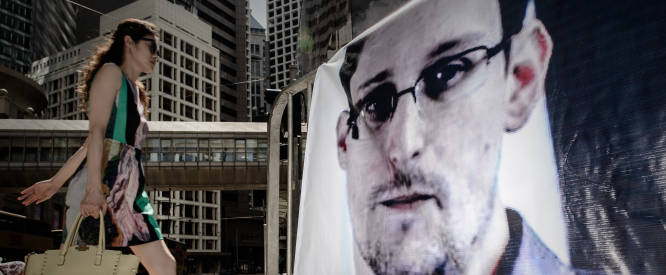 After Paris Attacks, CIA Head Reignites Surveillance DebateFollow @sarah_childressNovember 16, 2015, 6:21 pm ET Just three days after the bloody attack in Paris, America’s top intelligence official took to a podium and suggested that recent leaks about classified surveillance programs were partially responsible. “Unauthorized disclosures” have led to “a lot of hand-wringing over the government’s role in the effort to try to uncover these terrorists,” said CIA director John Brennan in remarks on Monday. “There have been some policy and legal and other actions … that make our ability collectively, internationally, to find these terrorists much more challenging, and I do hope that this is going to be a wake up call.” Brennan didn’t mention Edward Snowden by name. But the documents the former NSA contractor leaked to journalists in 2013 revealed just how much data the U.S. collects on foreigners and Americans alike. He exposed two classified programs — Section 215 of the Patriot Act, which collects telephone records in bulk, and Section 702, which authorizes spying on non-U.S. citizens. U.S. officials have said that the disclosures have endangered national security by encouraging terrorists to use encrypted messaging systems and software to conceal their identities online, a point Brennan underscored on Monday. “There has been a significant increase in the operational security of a number of these operatives and the terrorist networks as they have gone to school on what it is they need to do to keep their activities concealed from the authorities,” Brennan said in remarks at the Center for Strategic and International Studies. “As I mentioned, there are a lot of technological capabilities that are available right now that make it exceptionally difficult both technically as well as legally for intelligence security services to have the insight they need to uncover it.” Brennan’s remarks reignited a long-running debate on the balance between civil liberties and national security, which gained momentum worldwide after Snowden revealed the long reach of U.S. surveillance. But privacy advocates note that terrorists have been aware long before Snowden that the U.S. government has the ability to track them. And there’s no indication so far that the Paris attacks, which killed 129, could have been stopped by other techniques, security experts said. The Islamic State has claimed responsibility, but it’s still not yet known how the attacks were planned and how they might have been disrupted. “I don’t think it’s fair,” said Steven Aftergood, director of the Federation of American Scientists Project on Government Secrecy, of Brennan’s remarks. “It’s premature at best and it may be entirely wrong. And it’s not clear to what extent surveillance would or could or did make a difference.” He added: “It’s not as if people needed Snowden in order to realize that governments, including the U.S., gather intelligence or are attempting to anticipate and defeat attacks on their country. That’s a given.” Since Snowden’s disclosures in 2013, the U.S. government has defended the programs, arguing that they have disrupted terror attacks. A presidential review board set up to evaluate both programs found privacy concerns with each program, and examined their effectiveness. It noted that Section 702, which allows the collection of internet and phone data for non-U.S. persons, “has directly enabled the thwarting of specific terrorist attacks, aimed at the United States and at other countries.” One of the incidents officials have pointed to is the 2008 attacks in Mumbai, in which gunmen killed 166 people. A report by FRONTLINE and ProPublica found that even though intelligence officials were able to monitor a key plotter in the attack, the information wasn’t closely analyzed in time to prevent the massacre. The same board found “minimal value” in Section 215, the program that gathers bulk telephone data on U.S. citizens. “We have not identified a single instance involving a threat to the United States in which the program made a concrete difference in the outcome of a counterterrorism investigation,” it said. “Moreover, we are aware of no instance in which the program directly contributed to the discovery of a previously unknown terrorist plot or the disruption of a terrorist attack.” In the meantime, the disclosures have led to new oversight and some changes to the programs. In two weeks, a provision of the new USA Freedom Act takes effect that prevents the NSA from collecting and storing American phone data in bulk. That data will still be retained, but now it will be kept by the phone companies instead, shared with the government only upon authorization. Data for non-U.S. citizens will still be collected by the government. A woman walks past a banner displayed in support of former US spy Edward Snowden in Hong Kong on June 18, 2013. (Philippe Lopez/AFP/Getty Images)
RELATED
|
SUPPORT PROVIDED BY
|
FRONTLINE Watch FRONTLINE
About FRONTLINE
Contact FRONTLINE
Privacy Policy
Journalistic Guidelines
PBS Privacy Policy
PBS Terms of Use
Corporate Sponsorship
FRONTLINE is a registered trademark of WGBH Educational Foundation.
Web Site Copyright ©1995-2016 WGBH Educational Foundation
PBS is a 501(c)(3) not-for-profit organization.







In order to foster a civil and literate discussion that respects all participants, FRONTLINE has the following guidelines for commentary. By submitting comments here, you are consenting to these rules:
Readers' comments that include profanity, obscenity, personal attacks, harassment, or are defamatory, sexist, racist, violate a third party's right to privacy, or are otherwise inappropriate, will be removed. Entries that are unsigned or are "signed" by someone other than the actual author will be removed. We reserve the right to not post comments that are more than 400 words. We will take steps to block users who repeatedly violate our commenting rules, terms of use, or privacy policies. You are fully responsible for your comments.